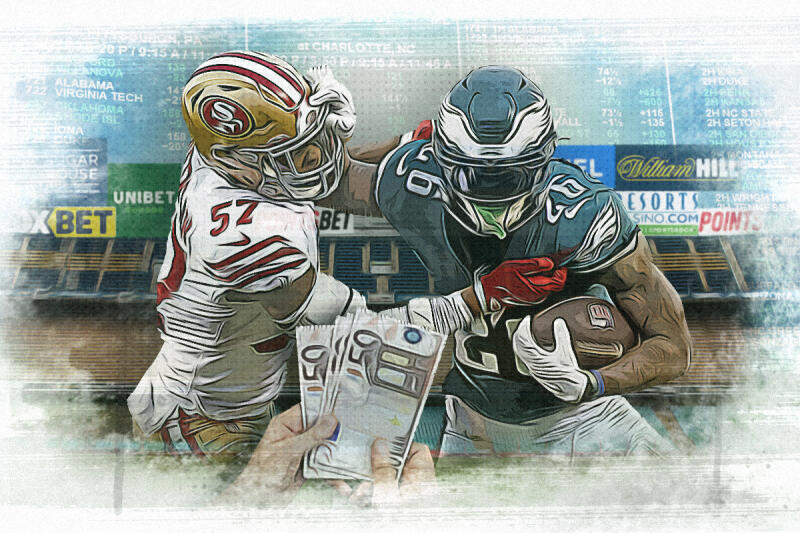Hedging Calculator for Sports Betting
Contrary to the old saying, sometimes it makes sense to bet against yourself. In the world of sports, this is called hedging your bet, and it's a great way to guarantee profits for certain bets.
While the concept is simple, choosing when and how to use hedge betting is more complicated. This guide will explain how and when to calculate your hedge bet, giving you the best chance for the highest-possible guaranteed profit.
What Exactly is Arbitrage Betting?

Arbitrage betting is when you place a hedge bet against your original bet to guarantee a profit, ensuring you win regardless of the game’s outcome. The idea is to give up some potential winnings to guarantee some profit.
For example, say you bet on the Ottawa Senators to win the Stanley Cup at +1000. The Senators make the Stanley Cup Final, but you want to be sure you don’t lose all your original bet profit in a best-of-seven series. This is when you place a hedge bet on their opponent, ensuring your initial bet is covered and guaranteeing a profit.
While the strategy is relatively straightforward, it's critical to use a hedging calculator to guarantee yourself the maximum profit.
How to Use an Arbitrage & Hedge Betting Calculator
An arbitrage calculator is crucial for maximizing profit for each hedge bet. Ours is simple and easy to use, allowing you to check to see if a hedge makes sense quickly.
Here is a step-by-step guide to using a hedge bet calculator:

Once you have your recommended amount from the calculator, you can confidently place your hedge bet. Always remember to double-check your numbers before placing any bet, as even a small typo could end up costing you money.
You can try out our betting odds calculator here.
Sports Betting Odds
It's imperative for you to have the most up-to-date odds available when using the calculator, as they have likely changed since you placed your original bet. Using the odds from the original bet (or that need to be updated) could result in you needlessly sacrificing profit or leaving you vulnerable to an unforeseen outcome.
If you aren't sure where the odds currently stand, you can click the "Odds" section at the top of the page. Be sure to check them right before you place your bet, as they can shift quickly and without warning.
Hedging Bets

Hedging bets are placed against bets that you have already placed. This strategy allows you to reduce the overall risk of the bet and guarantees you walk away with a profit.
Using our hedge calculator, you can determine how much you should place on a hedge bet based on your potential profit.
When to Hedge a Bet
Hedging strategies can be very profitable, but only in certain situations. The key to an effective hedge is covering all possible outcomes for an event. Therefore, you should only place hedge bets on events with a limited number of possible outcomes.
Aside from betting futures or long shots, parlays and live betting are two areas where hedging strategies often come into play.
How to Hedge a Parlay Bet
One of the most stressful parts of betting parlays is after you've hit your first few games and nervously await the final one. While some prefer an all-or-nothing approach, this is an excellent opportunity to place a hedge bet and guarantee a profit before the last game begins.
The first way to hedge a parlay is by placing a bet on the final game after the other teams have all won. Using our hedge calculator, you will plug in the original bet, odds, and hedge bet odds. This will give you a number for your hedge bet for the highest guaranteed profit.
The second way to hedge a parlay is by placing a few other parlays consisting of different combinations from your original bet. This is referred to as a "round robin" and ensures that not every leg of your original bet will have to win, though the odds will be less favorable. This strategy puts a cap on your potential profit, but it does offer more safety.
How to Hedge a Live Bet
Live betting is available in most states and offers an excellent opportunity to hedge. Let's say you bet that the Packers will beat the Dolphins on Christmas. After watching the first half, you realize the Packers may be outmatched. You would use our hedge calculator using the live money line odds for the Dolphins to determine your bet amount.
Tracking the live odds is essential to maximize your bet when placing a live hedge. Wait too long, and the odds may not allow for a hedge bet to be made. Place the bet too soon, and you could end up giving up more of your profit than you needed to.
If you are considering this strategy, we recommend checking the updated live odds during each break in the game.

Hedge Calculator Examples
If you still need help with hedge bets, fear not! Here is an example of how to effectively use the hedge calculator:
Say you placed a pre-season $100 bet on the Eagles to win the Super Bowl with odds at +2440 and a total profit of $2,440. You watch the Eagles cruise to the Super Bowl, but they're matched up against a tough Buffalo Bills team.
You decide to place a hedge bet to avoid missing out on that massive profit. You plug in the original bet amount ($100), original odds (+2440), and the hedge bet odds (Bills +150). This will calculate the amount to bet as well as the guaranteed profit.
Here is a table showing how everything breaks down:
| Result | Amount Wagered | Profit from Win |
| The Eagles win the Super Bowl | $100 | $2440.00 |
| The Bills win the Super Bowl | $725.71 | $1,714.28 |
While the hedge bet amount is higher, it gives you a guaranteed profit of $1,714.28.
Optimal Hedge Size
The ideal hedge bet size will depend on your strategy, but it should be enough to win the highest possible guaranteed profit.
According to a famous quote from French mathematician Blaise Pascal, "The excitement that a gambler feels when making a bet is equal to the amount he might win times the probability of winning it." While we don't have a tool to calculate that, it's something to keep in mind when deciding on a hedge bet.
Payout Scenarios
Once you've placed your hedge bet, there are two payout scenarios. The first is if your original bet hits, maximizing your profit. This is ideal and usually the scenario that provides the most winnings.
The second payout scenario is if the hedge bet hits. Depending on your strategy, this will at least cover your losses from the first bet and add on some profit.
If you need clarification regarding the payout scenarios for your bets, our hedge bet calculator can help show you each possible scenario before your bet is placed.
Hedging Strategy
When determining your hedging strategy, it's crucial to establish what your goal is. Are you looking to take the risk to increase potential profit, or are you more concerned with avoiding losses?
Here's a look at three major hedging strategies:

FAQ
What kind of bets should be hedged?
As a rule, you should only use hedge betting on games with limited possible outcomes. For example, a Super Bowl money line hedge bet would be ideal, while placing a hedge bet on a NASCAR outcome would be impossible.
What is the difference between hedging and arbitrage sports betting?
Hedging a bet means limiting your profits to protect yourself from losses. Arbitrage betting is making a bet that guarantees a certain profit regardless of the outcome.
How to use a Hedging Calculator in Sports Betting?
Enter your original bet total, odds, and hedge bet odds into the spaces provided. The calculator will give you the amount to bet to guarantee the most profit.
Should I place a hedge bet when betting against the spread?
Hedging a spread bet is not recommended for new bettors, as line movements create several different possible outcomes. If you bet one team +7.5 in a game, the opponent's line may be down to -6 by the time you place your hedge bet, leaving a possible outcome where you lose both bets (Also known as middling).
Should I place a hedge bet when placing prop bets?
For prop bets with only two possible outcomes (i.e., 2.5 TD passes thrown), hedging your bet can be smart. For prop bets with multiple possibilities (i.e., First player to score), hedging would be extremely risky.
Our editorial content strives to be highly informative and educational to our audience, especially for visitors who are new or relatively new to analyzing and predicting sporting event results. All of our content is created by informed writers with backgrounds in their subject area and reviewed for omissions or mistakes.
Our editorial team is run by individuals with many years of experience in digital publishing, editorial, and content production. Our editorial content is always marked clearly in any instances where it may be sponsored by a third party, though it is still reviewed by our staff to ensure it remains consistent with our company mission.
- Popular
- Latest





